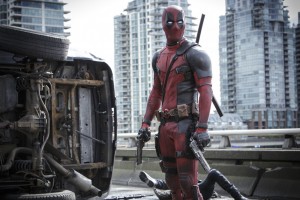 Based upon Marvel Comics’ most unconventional anti-hero, Deadpool tells the origin story of former Special Forces operative turned mercenary Wade Wilson, who after being subjected to a rogue experiment that leaves him with accelerated healing powers adopts the alter ego Deadpool. Armed with his new abilities and a dark, twisted sense of humor, Deadpool hunts down the man who nearly destroyed his life.
Based upon Marvel Comics’ most unconventional anti-hero, Deadpool tells the origin story of former Special Forces operative turned mercenary Wade Wilson, who after being subjected to a rogue experiment that leaves him with accelerated healing powers adopts the alter ego Deadpool. Armed with his new abilities and a dark, twisted sense of humor, Deadpool hunts down the man who nearly destroyed his life.
Ryan Reynolds, the film’s star and producer, has no bigger fan than Marvel Comics legend Stan Lee, who has a fun cameo in the film and also serves as an executive producer. “There’s never been a character like Deadpool, and Ryan Reynolds plays him as though he was born to play the role,” says Lee. “Just like Robert Downey, Jr. was born to be Iron Man, you just can’t picture anybody else besides Ryan as Deadpool.”
Reynolds embraced the character’s myriad and often twisted facets. “In the comic book world, Deadpool is a man of our time with the ability to spout just the right thing, in terms of a pop culture reference, at the worst possible moment,” he quips. “That’s what makes him interesting to me and also makes him sort of limitless.”
Reynolds had long championed a film version of the iconic comics character. His deep involvement in the film’s development continued throughout production, in brainstorming sessions with director Tim Miller and screenwriters Rhett Reese and Paul Wernick (“Zombieland”).
Tim Miller, who makes his feature film directorial debut on Deadpool, notes, “I think Ryan’s personality and DNA are really infused in the character. It was a close match to begin with, which is why Ryan was so attracted to Deadpool in the first place.”
“Ryan has a tremendous sense of humor, is very quick, and the character has really seeped into him,” says Reese. “He became in a way our ‘Deadpool Police.’ Whenever we got off tone or were writing in a way that didn’t feel quite right, Ryan would say, ‘I don’t think that sounds like Deadpool.’ We knew he was the best arbiter, because Ryan knows and loves the comics and has assimilated Deadpool’s voice and sense of humor.”
“We’re staying as true to the character as possible,” adds Reynolds. “We really ran with the idea of Deadpool being aware he’s a comic book anti-hero. It gave us the freedom to tell this story in a totally unorthodox way. We occupy a space that no other comic book movie has – or can.”
Deadpool is also known as the “Merc with the Mouth” – and for good reason. “A lot of comic book movies almost feel like you could watch them without sound and still get what’s going on,” notes Reese. “We wanted you to hear Deadpool’s voice and his comedic commentary, so we really embraced dialogue. This is not one of those movies where the hero is silent for 15 minutes. In DEADPOOL, the other characters can’t get a word in edgewise, because he’s constantly filling silences with lucidly insane cracks.”
Deadpool is a unique figure in the Marvel Universe. Fabian Nicieza and Rob Liefeld created Deadpool as possessing an often non-superheroic attitude. A sardonic foil to the holier-than-thou heroes and villains that populate Marvel’s other comics, Deadpool constantly cracks edgy jokes and breaks the fourth wall.
Liefeld joins Stan Lee in his admiration of the filmmakers’ work in translating the character to the big screen. “DEADPOOL explodes with action,” says Liefeld. “Ryan, Tim Miller, Paul and Rhett mined all the good stuff in the comics from about a ten-year period and came up with a movie that sews it all together. This will be the Deadpool that will become canon moving forward!”
Director Miller provides Deadpool’s cinema incarnation with a fractured narrative that hurtles back-and-forth in time. The film is anything but predictable, while also being accessible to those who’ve never before encountered the Merc with the Mouth.
The character’s accessibility is defined partly by his twisted sense of humor. “It really draws you in,” Reynolds notes. “Deadpool has this bright, optimistic outlook on life, even though his life is pretty shitty. I mean, he’s become horribly disfigured from the experiments that gave him his powers. And, he can’t find love and he’s more than a little insane.”
Reynolds’ director is also infused with Deadpoolian traits. “Tim has a bit of Wade Wilson’s acerbic attitude in him,” says Reynolds. “He sort of speaks, moves and talks like him, too. I think that helped Tim access the character. He really understands how to balance the over-the-top action and humor with pathos, because in some ways, Wade Wilson is a tragic character.”




Speak Your Mind